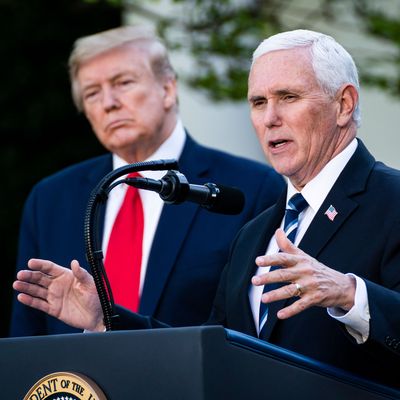
After a long period of silence on the subject of the 2020 election, some of which he spent hiding from an insurrectionist mob that was attempting to lynch him, Mike Pence has reemerged. The former vice-president has written an op-ed for the Heritage Foundation laying out the next steps in the Republican Party’s campaign to curtail democracy.
Pence’s analysis is worth considering in some detail. As both a faithful servant to Donald Trump and a respected member of the Republican Party’s most ideologically orthodox wing, Pence holds a position that represents a synthesis of Trump’s idiosyncratic personal authoritarianism and his party’s longstanding anti-democratic trend.
Pence doesn’t acknowledge any error made by Trump or even concede that he legitimately lost the election. Instead, he hints that wrongdoing by state officials allowed Joe Biden to steal it:
After an election marked by significant voting irregularities and numerous instances of officials setting aside state election law, I share the concerns of millions of Americans about the integrity of the 2020 election.
No officials “set aside” state laws. They acted to expand mail voting in compliance with state laws. Sometimes these orders were litigated through the courts, but that is how state laws work. Pence does not have any evidence of “significant voting irregularities.” Millions of Americans have “concerns” about the election’s “integrity” simply because Trump and Pence spent months before and after the election circulating false claims.
The only credible allegation of illegal behavior in the election involves Trump himself, who was caught on tape threatening action against officials unless they produced enough votes to flip the state into his column.
Pence does concede that the insurrection was regrettable, but his language is painstakingly crafted to avoid attributing any responsibility:
The tragic events of Jan. 6 — the most significant being the loss of life and violence at our nation’s Capitol — also deprived the American people of a substantive discussion in Congress about election integrity in America.
The structure of this sentence is fascinating. Its action verb is deprived. Who committed the depriving? Events. And what was deprived? A “substantive discussion in Congress about election integrity” — i.e., another forum to repeat Trump’s lie about the election being stolen. So nobody was responsible for the mob of Trump supporters attempting to cancel the election, but the victims were the people feeding the mob’s delusions.
Pence then turns toward the twin purposes of his column: opposing Democratic efforts in Congress to guarantee ballot access and end gerrymandering, while endorsing Republican efforts to restrict the franchise with strict photo-ID requirements, limits on early and mail voting, and so on.
In typical fashion, he superimposes his own calculation onto the Democrats:
Every single proposed change in HR 1 serves one goal, and one goal only: to give leftists a permanent, unfair, and unconstitutional advantage in our political system.
It is true, at least in the short run, that democratic reforms would benefit the Democratic Party. It is not true, however, that this is their only goal. Allowing people to participate in elections and enhancing the small-d democratic character of the system is also a goal, albeit not one many Republicans seem able to comprehend.
And it is simply false to suggest the bill gives Democrats an “advantage.” The Republican Party currently enjoys significant advantages in the House, Senate, and Electoral College, all of which have a midpoint several points more Republican than the country as a whole. Even if Democrats enacted their proposals to expand voting and eliminate gerrymandering — and went even further by granting statehood to D.C. and Puerto Rico — this would merely reduce, not eliminate, the GOP advantage.
Pence proceeds to argue that all changes to election law must be carried out at the state level. This conveniently means the changes will be designed by Republican officials rather than by Democrats, who control Congress. Pence presents this as a matter of constitutional principle:
Our Founders limited Congress’ role in conducting our elections for good reason: They wanted elections to be administered closest to the people, free from undue influence of the national government.
In fact, the Constitution gives Congress authority to regulate federal elections, and it has used this authority many times.
Pence further insists that, if Congress were to eliminate gerrymandering, “congressional districts would be redrawn by unelected, unaccountable bureaucrats.” Can voters hold Congress accountable for drawing maps that make it impossible to dislodge the majority party? Not really! That’s kind of the point of drawing those maps in the first place.
Pence’s most remarkable rhetorical maneuver is to argue that we must “heal” the country, which means not passing any election-law changes in Congress, and then proceeds to argue in the very next paragraph for restoring “confidence” by imposing voter-suppression measures in the states:
After a year in which our nation has endured a global pandemic, economic hardship, and a contentious election, now is not the time to further inflame passion and division. It is time for our nation’s leaders to help America heal.
To restore public confidence in our elections, our leaders should uphold the Constitution, reject congressional Democrats’ plan to nationalize our elections, and get about the serious work of state-based reform that will protect the integrity of the vote for every American.
Healing the country means preventing Democrats from passing election laws, but Republicans must.
Republicans were turning against democracy before Trump came along. Then most of them decided to use him to advance their goals, and in the process, he refused to accept democracy as a core element of the base’s belief system. And now Pence seeks to lead them into a future in which minority rule can be locked in forever.






























